The Emergency Development Programme (EDP)
In 2018, the G5 Sahel member countries asked the G5 Sahel Executive Secretariat (SEG5) to draw up an Emergency Development Programme (EDP) to stabilise the areas facing complex security challenges and severe economic, social and climatic vulnerability. The Sahel Alliance members have mobilised since December 2018 to implement this programme. Their goal: to improve the living conditions of the populations in the fragile border regions of the three Joint Force intervention areas epicentre of the Sahelian crisis.
The main intervention pillars are:
- To help improve the living conditions of the local populations through better access to water and sanitation.
- To improve the livelihoods of agricultural and pastoral populations by strengthening their structural and long-term resilience to food and nutrition insecurity.
- To support local communities and institutions in their efforts to prevent conflict and strengthen social cohesion by reinforcing the local socio-economic fabric.
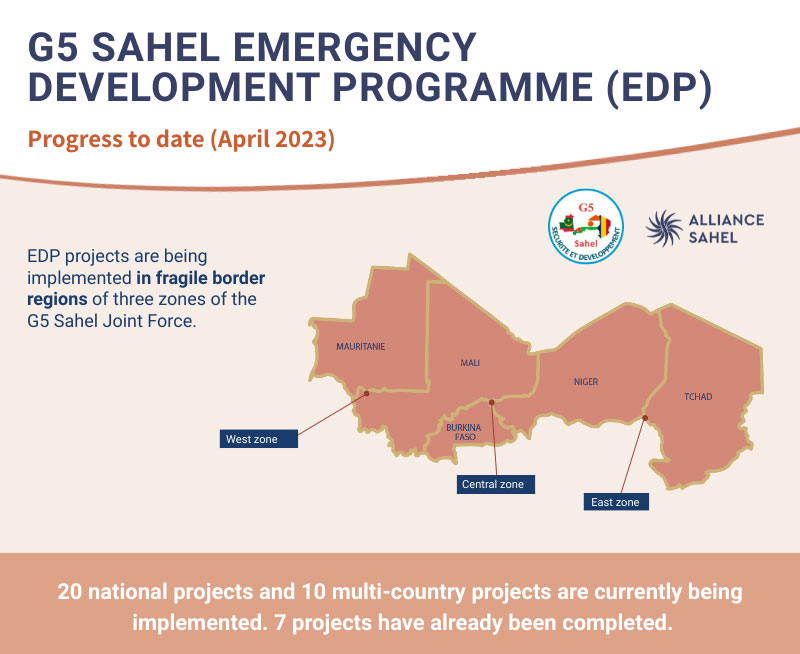
Recognising the relevance of this programme and the results achieved, Alliance members have increased their initial financial commitments. The amount mobilised now stands at € 533 million, an increase of 93% over the initial budget.
Three years into its implementation, the Sahel Alliance members note that the EDP is an appropriate and effective tool to help meet the basic needs of populations in crisis and strengthen social cohesion among the communities.
Today:
- 20 national projects and 10 multi-country projects are being implemented.
- 7 projects have been completed.
- € 327 million has been disbursed, demonstrating a higher implementation capacity (40%) than is usually the case for funded projects in the G5 Sahel countries.
These projects significantly contribute to :
- the delivery of essential services to the most vulnerable populations
- the restoration or consolidation of social cohesion.
Aiming for rapid and tangible results, they focus their support on basic services to help beneficiaries stay in their territories by meeting their basic needs
Pillar I : Access to water and sanitation
Pillar 1 projects target the overarching objective of expanding access to water and sanitation. They have already enabled 1,660,000 people to have improved access to drinking water and 1,300,000 beneficiaries to use better sanitation services.
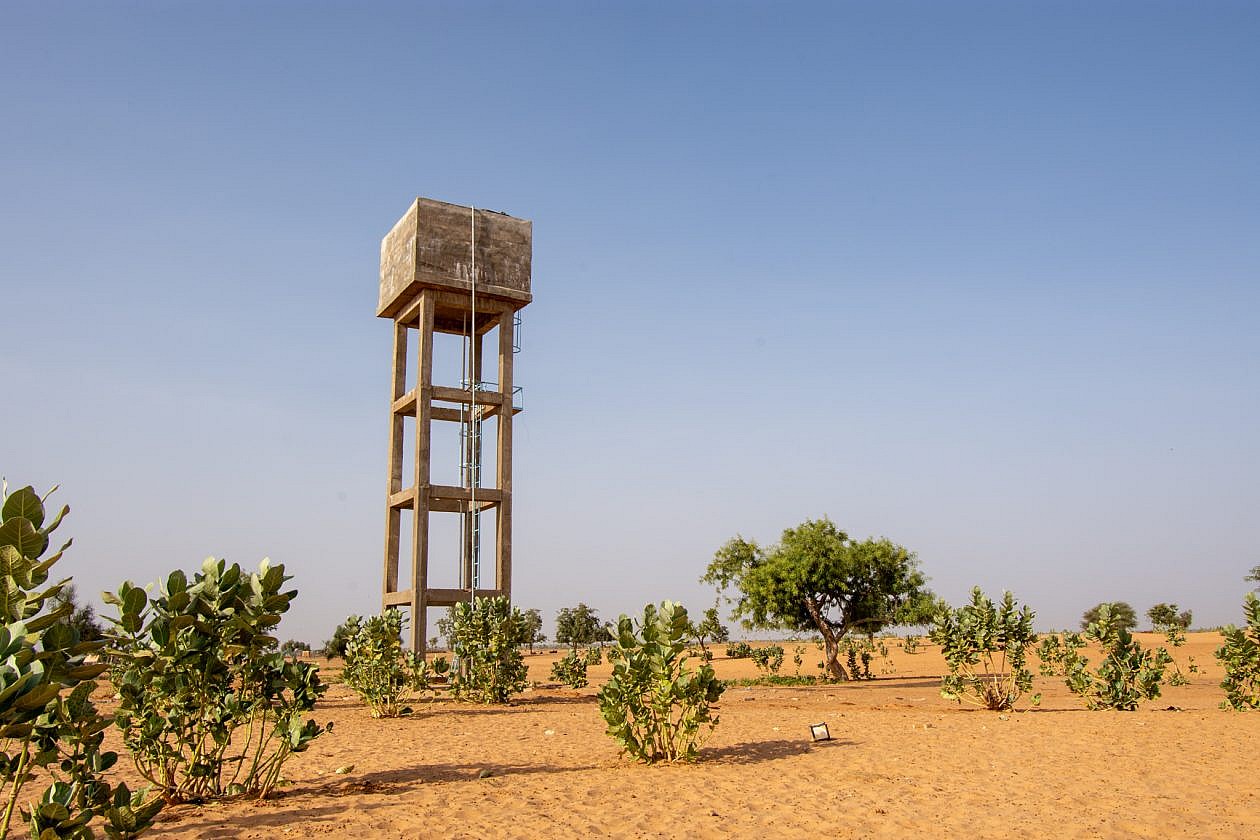
In Mauritania, the “G5-2Hodh” project (€ 12 million, French/AFD funding) finances emergency rehabilitation work on the infrastructure providing access to drinking water in the Hodh Ech Chargui and Hodh El Gharbi regions. Between June and November 2020, thanks to the emergency status of the project implemented by the Mauritanian Ministry of Hydraulics and Sanitation, 14 communities had their drinking water system rehabilitated, to the benefit of 50,000 inhabitants. 17 wells have been drilled. 170,000 people now have improved access to sanitation services in these two regions.
In Mali, the Reconstruction and Economic Recovery Project – PRRE ($30 million in additional EDP funding from the World Bank) has been active in 149 municipalities in the regions of Ségou, Mopti, Gao, Timbuktu and Kidal.
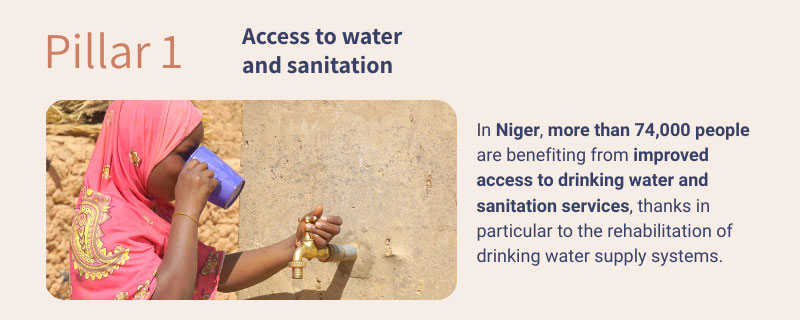
In Chad, under the EPEVA project (€5.9 million) of the G5 Sahel Emergency Programme for the Stabilisation of Border Areas (EU-PDU), more than 90,000 people are benefiting from improved access to drinking water and sanitation services.
Pillar II : Resilience to food and nutritional insecurity
Programmes under Pillar 2 provide multi-sectoral support to help people preserve and strengthen their livelihoods.
To cope with the most extreme situations, the EDP projects have made it possible to provide food assistance to 440,000 beneficiaries, by:
- Implementing social safety nets and adaptive protection systems targeting the most vulnerable sections of the population
- Facilitating income-generating activities
- Strengthening the fabric of small and medium-sized enterprises in the territories
- Rehabilitating agricultural land and pastoral activities.
They have thus enabled 1,700,000 people to maintain and develop their livelihoods and incomes in their local areas.
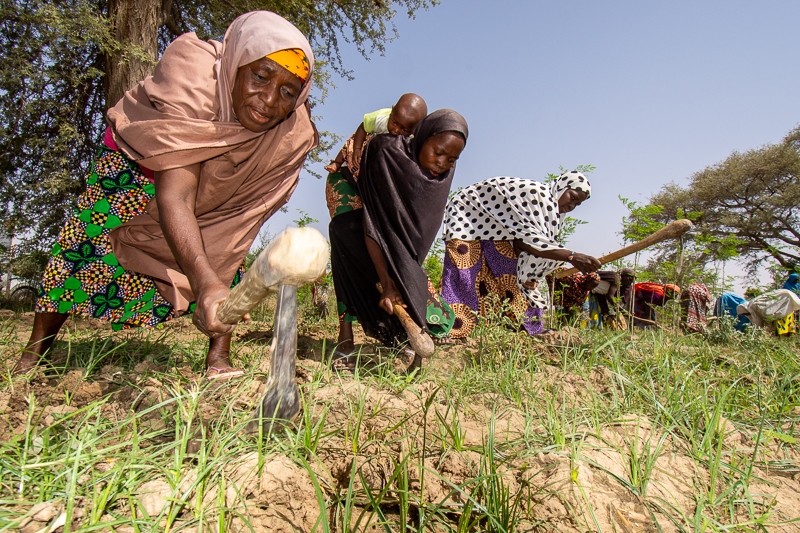
In Niger, the Strengthening Resilience and Human Development Programme funded by the Spanish cooperation (€ 10,8 million), implemented in the Tahoua region, enable nearly 7,000 beneficiaries (including 70% of women), to maintain and develop their livelihoods and income. The programme has promoted the use of renewable energy (photovoltaic energy installations) for income-generating activities and agricultural production. It has developed integrated production farms (agriculture and livestock), improved rest areas along livestock tracks and infrastructure for the storage and processing of gum arabic.
The World Bank’s Social Safety Net System Support Project II ($30 million), co-financed via the SASPP multi-donor fund for strengthening adaptive social protection (involving the German Development Cooperation/BMZ, France via the French Development Agency, the Danish International Development Agency and the British Development Cooperation), has enabled more than 1,100,000 people, including more than 600,000 women, to preserve and promote their livelihoods in Mauritania. This project contributes to increase the effectiveness and efficiency of the national adaptive social safety net system and its coverage of poor and vulnerable households through targeted social transfers, particularly in refugee and host communities.
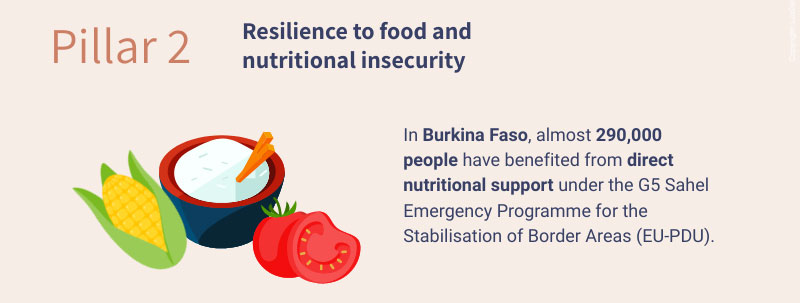
The Emergency Programme for the Stabilisation of G5 Border Areas (PDU-UE), funded by the European Union to the tune of nearly €150 million, has supported more than 440,000 people in the 5 Sahel countries with social safety nets and almost 400,000 people with nutritional assistance.
Pillar III : Strengthening social cohesion
The actions undertaken under Pillar 3 aim to strengthen or even rebuild trust between the various communities but also among civil populations, the authorities and public institutions. They create spaces for dialogue, conflict management committees, communication and awareness-raising tools (community radio, peace caravans) and place young people and women at the heart of the mediation and conflict prevention processes.
The EDP has thus supported the creation of 1,900 structures contributing to conflict prevention and social cohesion and has made it possible to raise awareness among 1,200,000 people in the five Sahelian countries.
In Mali, the activities of the UNDP’s Youth and Peace phase II project ($1,500,000) in the Centre and North regions (Koro, Bankass, Tominian, Amderamboukane, Ansongo and Menaka) are strengthening the citizenship of young people with a view to encouraging their involvement and participation in the process of consolidating peace and security. The project has provided support for 6 Communal Youth Councils and raised awareness among 1,300 people about conflict prevention and social cohesion.
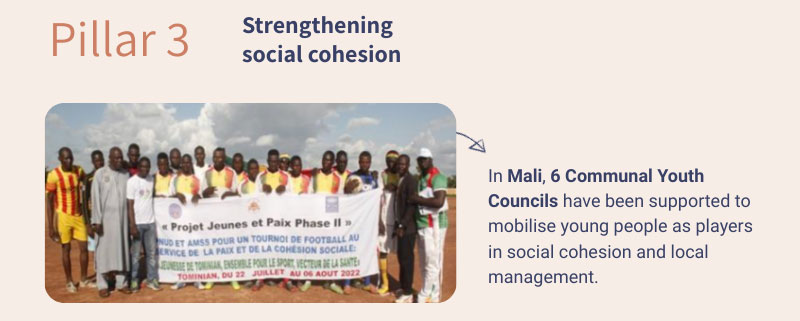
The regional “Agro-pastoral mediation in the Sahel” project, financed to the tune of €5 million by the European Union, structure networks of nomadic, semi-nomadic and sedentary mediators to prevent and manage conflicts linked to the exploitation of natural resources. It facilitates access by nomadic communities to pastoral resources during the transhumance period in order to prevent conflicts with sedentary communities. The project also supports dialogue between communities and the authorities to promote the peaceful management of natural resources and prevent cattle theft. More than 340,000 people have benefited from conflict prevention activities.
An integrated approach to stabilising border areas
21 projects contribute to 2 or 3 pillars in an integrated approach in order to strengthen the resilience of populations and reduce the number of inter-community conflicts in the most vulnerable areas.
The European Union’s Emergency Regional Programme for the Stabilisation of the G5 Sahel Border Areas (€147.5 million) favours a multi-sectoral and flexible approach to intervene in the regions most exposed to extreme poverty and conflicts.
Implemented by technical partners and local companies (pillar 1: water and sanitation) and by consortia of local and international NGOs (pillars 2 and 3), it mobilises a wide range of players in interaction with local communities and authorities. It focuses as much on social protection, health and nutrition as on food security and the preservation of livelihoods, local governance and social cohesion.
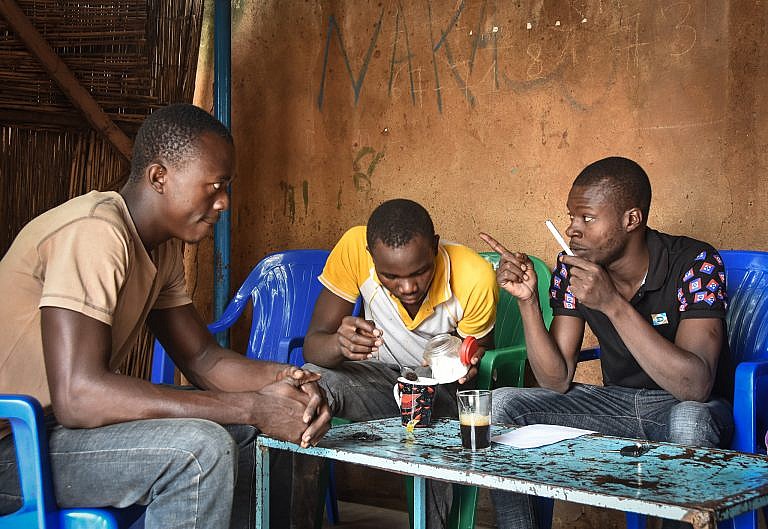
Financed by France (AFD/CDCS), the “Trois Frontières” Regional Project (€56,630,775) is active in the Liptako Gourma border area (Mali, Burkina Faso and Niger), which faces numerous challenges combining security threats with economic, social and climatic vulnerabilities. It aims to respond to the most urgent needs expressed by communities in this cross-border area, while supporting the revival of economic activity, the return of legitimacy to public action and the strengthening of the rule of law.
In the implementation of the EDP, particular attention is paid to support to local authorities and devolved state services, to enable them to better fulfil their role as service providers for the benefit of the populations and contribute to their revaluation in the eyes of the beneficiaries.
EDP projects thus contribute to the functioning and capacity building of the municipalities, to the project management of local authorities and to the development of strategies for the mobilisation of municipal resources. They support local authorities in improving their accountability towards their constituents and in promoting inclusive and participatory governance.
Several EDP projects have been co-financed or parallel-financed by members of the Sahel Alliance, in a partnership approach that reflects the strengthened operational coordination between donors and illustrates the benefits (the reconstruction and economic recovery projects in Konna, Mali, and the projects of support for social safety nets in Mauritania are emblematic examples). Three of them are part of a regional approach, at the G5 Sahel level, in order to address common challenges while also contributing to the strengthening of sub-regional integration.
Lastly, a “multi-stakeholder” implementation (States, local authorities, NGOs, etc.) has been prioritised in order to best adapt to the intervention contexts of particularly fragile areas.
Faced with an unprecedented deterioration in the security and humanitarian situation in the Sahel, EDP projects are developing approaches and operating methods adapted to a rapidly changing context. Their implementation is characterised by a high degree of flexibility, with changes of direction (in terms of content or geographical focus) to take account of the difficulties encountered or changes in intervention situations, so as to remain as close as possible to the people of the Sahel.
List of EDP projects (in French)

